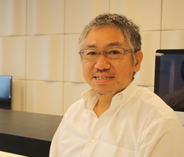 Established in 1954 in Setagaya ward, Tokyo, FUJI GAS Corporation has been making steady progress as one of the few LP gas sales companies that own LP gas charging facilities in the 23 wards of Tokyo. Diversification is part of their business strategy, which is reflected in one-of-a-kind service they offer, for example, renting heating appliances that come into their own as a convenient equipment at an event, among others, as well as sales of water heaters for city gas. The company places importance on employees’ development by training, which ranges from helping the employees to obtain government licenses, running management strategy seminars, which are directly related to business, and lecturing of emergency rescue procedures, to teaching Aikido (a martial art for self-defense). Treating the workers well, it’s the value that occupies an importance place in its corporate culture, for which as well as for its differentiated marketing strategy the company has a good reputation. We welcome Mr. Tsuda, President and Representative Director, FUJI GAS Corporation in this issue. Besides performing the vital role, he has given management strategy seminars for the young entrepreneurs from different fields of work.
Established in 1954 in Setagaya ward, Tokyo, FUJI GAS Corporation has been making steady progress as one of the few LP gas sales companies that own LP gas charging facilities in the 23 wards of Tokyo. Diversification is part of their business strategy, which is reflected in one-of-a-kind service they offer, for example, renting heating appliances that come into their own as a convenient equipment at an event, among others, as well as sales of water heaters for city gas. The company places importance on employees’ development by training, which ranges from helping the employees to obtain government licenses, running management strategy seminars, which are directly related to business, and lecturing of emergency rescue procedures, to teaching Aikido (a martial art for self-defense). Treating the workers well, it’s the value that occupies an importance place in its corporate culture, for which as well as for its differentiated marketing strategy the company has a good reputation. We welcome Mr. Tsuda, President and Representative Director, FUJI GAS Corporation in this issue. Besides performing the vital role, he has given management strategy seminars for the young entrepreneurs from different fields of work.
Ozawa: Thank you for sparing your precious time for us. Today, I would like to ask you about the full office renovation FUJI GAS Corporation has realized recently. Mr. Tsuda, you also run the company that plans and implements the management seminars, so being well versed with the leading edge management strategy theories.
Tsuda: This full office renovation was one of our management measures we implemented on the occasion of the company’s 60 years anniversary, thinking about the future direction of the employees’ way of working.
Ozawa: What did you particularly pay attention to in pushing ahead the renovation project?
Tsuda: I am always aware that the working environment in the office enormously influences on how the employees work as well as how much they are motivated. We find something we can relate to in what DOUMA’s consulting service offers. We asked for your help because it has the insight on what the corporate culture and working style should be. The first priority in this project was to come up with a measure to encourage active communication even more within the organization and then to shake off the organization’s climate where each business department worked like a separate, independent company.
Ozawa: Earlier, when discussing with you about the road map for developing an office concept, which DOUMA proposed, you asked us to examine it again and come up with a more profound solution. Simply put, the FUJI GAS Corporation moved on to the idea of virtually forcing the interactions throughout the organization by way of eliminating the structural frames, separating the employees based on the way they perform their functions, and then working out a different office plan according to the respective functions, after writing off the office idea that encourages the smooth communication across the board, by way of placing emphasis on structural cohesion up to a point.
Tsuda: I was nurturing the idea that it was a must in order to break interdepartmental barriers. I can say managers at our company are fully independent and we all are rather united, so we believed even if we are structurally mixed in the office environment, there would not be much confusion made. We put a positive spin on this project, being assured that this benefits us by activating the interactions.
Ozawa: Eventually, we came to separate the employees into the three types; “Resident” who work inside the company most of the time, “Mobiler” who work outside the company for sales activities most of the time, and “Nomad” who move around inside the company most of the time. Then, we elaborated the office plan with the three floors, each serving for respective workers. It makes sense that this ensures the better interaction among them, because there are these three types of employees working in different departments.
Tsuda: As we expected, the population density differs by the floor, so does the atmosphere considerably. I have noticed that the communication between the employees has improved significantly, going beyond the boundaries between departments. Managers seem to have become more action-oriented and energetic.
Ozawa: They are placed in a new office environment where they did not work before. So there must have been a certain extent of confusion made, but it evidences that you have succeeded in embodying the office concept as management measures. Hearing from you today has convinced me that your company will surely achieve its vision. Thank you again for being with us today.
